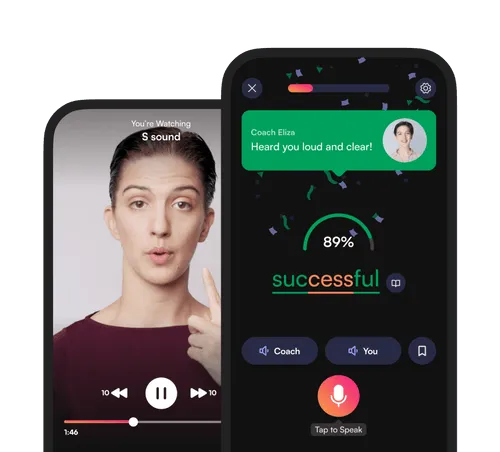The speaking section of the IELTS exam is one out of four components, which contributes 25% to your overall score. It assesses your ability to communicate effectively in English, examining fluency, coherence, pronunciation , and grammar.
Due to its demanding nature, it is not unusual for non-native English speakers to struggle with this exam.
The IELTS speaking exam is conducted in real-time, which means you must think on your feet, articulate thoughts, and express yourself under pressure. It's necessary to demonstrate a certain level of competency and a strong command of spoken English to achieve a high score.
It's doable, though! With IELTS practice tests, actionable feedback, and targeted practice exercises, the IELTS exam speaking section can be a breeze.
Ready to ace your IELTS test?
What to Expect From The IELTS Speaking Exam
The speaking section of the IELTS lasts around 11-14 minutes and is broken down into three sections:
Part 1: Introduction and Interview (4-5 minutes)Part 2: Long Turn (3-4 minutes)Part 3: Discussion (4-5 minutes)
Unlike the written parts of the test, the speaking exam is spontaneous, making it more challenging. Your examiner could ask follow-up questions that may steer the conversation in unexpected directions on test day, which means that simply memorizing a pre-written script is often not the best approach.
Instead, you must focus on improving your general English skills and response techniques if you want to ace this exam.
Let’s address some IELTS speaking exam practice exercises that will help you prepare for each section and wow your IELTS examiner.
Part 1: Introduction and Interview The first part is a question-and-answer section that assesses your ability to communicate. Your fluency, coherence, and pronunciation will be judged from the moment you begin to answer.
The examiner will ask you questions about yourself, typically starting with your name before progressing into common topics like:
Your home, family, or hometown Where you work or study Your hobbies and interests
To pass this part of the exam, you’re expected to respond fluently and give clear answers with enough detail to show your proficiency. The interviewer may also prompt you to elaborate on your responses if you don’t provide enough details.
Here are some exercises to help you prepare for the introduction and interview portion of the exam:
Practice for the IELTS exam Enhance your pronunciation level and get 7 days of lessons for free on the BoldVoice app.
Start Free Trial
Exercise 1: Speed Conversation Practice With a Partner
This IELTS speaking exam practice exercise is designed to improve your ability to respond quickly and naturally to questions. For this exercise, you’ll partner with a friend and have them ask you rapid-fire questions like a drill.
Your job is to respond immediately to each question while focusing on how fluent you sound. Try to keep each answer short but informative (about 30 seconds), giving as many relevant details as possible in the process.
Examples of rapid-fire questions that your partner can ask include:
What’s your favorite way to spend a weekend? How do you usually start your day? What’s the best place you’ve ever traveled to? What kind of movies do you enjoy watching? Can you tell me about your favorite book?
Exercise 2: Question Expansion Exercise
The question expansion technique helps improve your ability to provide detailed, thoughtful responses to questions. The goal is to avoid short answers and speak for a longer period so that you can showcase a wider range of vocabulary and grammar.
Revisit some of the questions we listed earlier, but this time, expand your answers with additional details like in the sample answers below:
Question: What do you do in your free time?
Rather than answering with “I like reading, ” you can expand your answer by:
Adding more details or information about the activity: “I enjoy reading, especially historical novels…” Explaining why you like the activity or how it affects you: “...because it helps me relax after a long day at work.” Including an example or personal experience: “...for instance, last month, I read a fascinating book about ancient Egypt, which gave me new insights into their art and architecture.”
Your answer should sound like this: "I enjoy reading, especially historical novels because it helps me relax after a long day at work. For instance, last month, I read a fascinating book about ancient Egypt, which gave me new insights into their art and architecture.”
You can even set a clock to two minutes, with the goal of speaking the entire time. This is longer than will be required of you for a single question in the exam, but it's a good idea to go above and beyond in practice sessions so that come your test date, it feels like a breeze in comparison.
Exercise 3: BoldVoice Pronunciation Exercises BoldVoice is an AI-powered accent training app that can help you answer questions fluently and confidently with consistent practice. The app’s advanced technology analyzes your speech and provides instant personalized feedback to help you boost your proficiency level.
From your speech analysis, BoldVoice curates a learning schedule and curriculum tailored to your specific needs. Here, you get access to hundreds of learning materials and video lessons focusing on pronunciation and spoken English, whether you need help with stress and intonation or specific vowel and consonant sounds.
BoldVoice offers interactive exercises, including roleplaying, to help you practice your lessons and simulate real-life IELTS exam scenarios before you take the exam. You can also record your practice sessions and track your progress over time, making it easy to monitor improvement in your speech.
What makes BoldVoice most helpful for your practice is its focus on fostering independent learning, eliminating the need for physical partners. Sign up on BoldVoice today to get started on your free 7-day trial.
Part 2: Long Turn The second part of your IELTS speaking exam entails you doing a lot more talking with very minimal interruption. You’ll typically be given a topic card with a question and asked to speak on it.
The examiner or interviewer gives you a minute to prepare, and then you speak for up to two minutes on the topic. Some sample questions that you should expect for this part include:
Describe a place you have visited that you would like to go back to. Describe a skill you have learned that you think is important. Describe an interesting job you would like to have.
To scale through this section, you’ll need to show that you can speak logically and at length about a subject. We advise that you exhaust all of the allotted time for this section, responding carefully and on-topic throughout.
For this part, these IELTS speaking exam practice exercises will help you prepare:
Exercise 4: Topic Card Simulation
Topic card simulation helps you mirror the long turn section of the IELTS speaking exam before test day. You’ll have to create topic cards; you can use the example questions listed above as a starting point.
Ensure you set your timer for three minutes in total and do a video recording of the entire process.
Next, take one minute to jot down a few key points, then speak for two minutes without stopping. Listen back to see if you actually answered the questions, and if your ideas flowed logically.
To judge impartially, focus on the structure of your speech, including your introduction, key points, and conclusion. For example, for the question “Describe a time when you helped someone, ” you should say:
Who you helped How you helped them Why you helped them
Remember, it's important to consider both what you say and how you say it. The how incorporates not only your pronunciation, but also the way in which you organize your ideas.
Exercise 5: Timed Vocabulary Expansion
Before the IELTS test, ensure you invest in broadening your vocabulary bank. You can research common IELTS speaking exam topics, such as "hobbies" or "travel ," and master as many related words as possible. This will help diversify your language and impress the examiner.
Assuming your topic is “Describe your job as a salesperson,” consider incorporating related sales phrases like “prospect,” "client," and “target” into your answer.
This exercise also helps improve your ability to speak at length in a structured manner, using rich vocabulary. A key element of learning new vocabulary is to then use those words repeatedly. Consider making cue cards to practice, and then incorporating your new vocabulary in your day-to-day life in a natural way.
Exercise 6: Storytelling Practice
When you tell a story over and over again, you begin to know it like the back of your hand. On your own, and as often as you can, select personal experiences from your life and narrate them.
For example, you could describe a memorable trip you’ve taken, the best day of your life, or even the worst mistakes you have ever made.
Remember to use the vocabulary you’ve learned and keep your narration short. The more you do this, the better you get at narrating events using vivid descriptions.
Like public speaking , impactful storytelling often comes down to the pacing of your speech, and how you incorporate pauses for emphasis. Take a look at BoldVoice coach Adeola explaining the concept of pacing in English, so you can impress your IELTS examiner and earn a high score:
Part 3: Discussion You’ll be having an actual two-way discussion with your examiner in this final part of the exam. This is a sharp contrast to the first and second parts of your exam, where you took center stage.
Part 3 tests your ability to discuss broader ideas and present arguments.
The examiner will ask more complex, abstract questions related to the topic from Part 2. For example, if your Part 2 question was about helping someone, Part 3 might involve questions about society’s responsibilities toward helping others.
You’ll need to prove that you can think critically, defend your opinions while communicating, and articulate complex thoughts clearly. The exercises below will help you practice:
Exercise 7: Debate with a Friend
Like with regular debates between oppositions, begin by choosing any topic with distinct differing opinions. This could be something serious, like the validity of the electoral college in the U.S., or something sillier, like whether ketchup versus mustard is the superior condiment.
The topic doesn't matter. What matters is your ability to support your opinion with well-formed, professionally-delivered points and counterpoints.
Take turns with your friend debating both sides of the argument. We recommend debating for and against your choice topics interchangeably, as doing this often builds your ability to compare and contrast different viewpoints or situations. This is especially useful because you can never tell what side of the debate you’ll need to defend until the exam begins.
Exercise 8: Roleplay
Roleplaying helps you critically analyze multiple sides of a topic to practice articulating arguments. The only difference between roleplaying and debating with a friend is that you can practice roleplaying on your own using the BoldVoice roleplaying feature.
What you do is simply choose any topic from the variety of options on BoldVoice and have a one-on-one speaking interaction with the app’s bot.
You can do this anytime, anywhere, helping you make the most of your free moments to prepare for test day.
Exercise 9: Practice Future Predictions
Again, to prove your ability to think critically and coherently, you must be able to discuss the real-world implications of theoretical concepts. Assuming your examiner gives you a topic related to future developments, such as the future of work or advancements in technology, how do you discuss this?
In this case, it might help if you’re updated on current trends by reading about emerging technologies, economic shifts, or societal changes. This is the only way that your answers would have real substance, so make sure you're reading the latest news, watching films , and keeping up with topical events and discussions.
You should also learn to incorporate common speculative phrases into your responses, like "it’s likely that" and "there could be…" to introduce your thoughts and elevate your spoken English .
Rely on BoldVoice to Ace the IELTS Exam The IELTS exam is no joke, and targeted preparation is an absolute must—especially for the notorious speaking section.
Many of the IELTS speaking exam practice techniques here simulate the real deal, preparing you to become confident in your responses. However, if you’re aiming for excellence, you must go the extra mile.
BoldVoice is an all-in-one English pronunciation platform that provides the resources, practice tools, and guidance that you need to ace the IELTS exam and wow your examiner.
Sign up on BoldVoice to enjoy your seven-day free trial and begin your preparation to conquer the IELTS on your first attempt.









